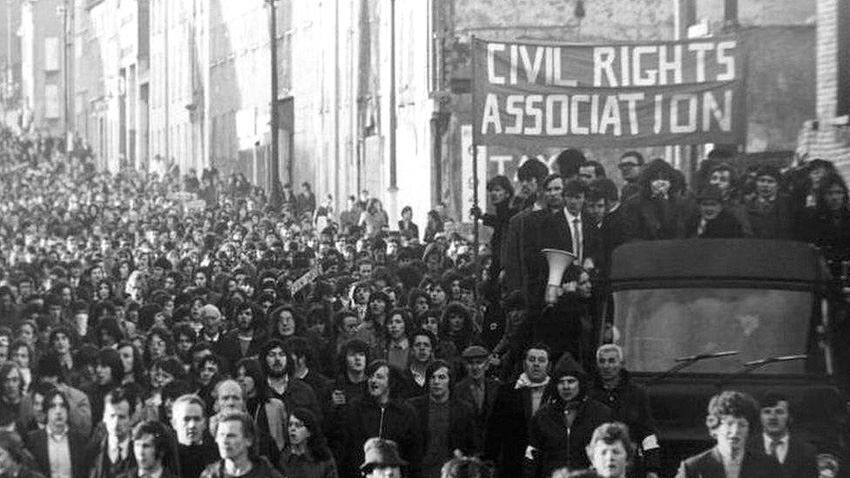
TROUBLE erupted on the streets of Belfast on Wednesday the 7th of April 2021. We can only ask if we are witnessing a return to the violent scenes of 1969.
The Northern Ireland Protocol has created the Irish Sea Border which is seen by unionists and loyalists as a diminution of their Britishness and of the continuing link between Northern Ireland and Great Britain and their fears for their future within a united Ireland which is now firmly on the political horizon.
The fall-out between the Democratic Unionist Party and Boris Johnson’s Conservative government has led to failed negotiations from the unionists to have the Northern Ireland Protocol revisited and amended between the United Kingdom and the European Union.
History in Northern Ireland has proved when unionism fails to deliver politically loyalism tries to deliver violently.
Violence on the streets is not a generic response from grassroots unionism to the Northern Ireland Protocol it is an orchestrated reaction from political unionism, the DUP and loyalist paramilitaries connected to the Loyalist Community Council comprising the Ulster Defence Association, the Ulster Volunteer Force and The Red Hand Commando.
While initially, sporadic violence occurred in the loyalist Waterside estate in Derry, about two hours from Belfast, about ten days ago, trouble erupted last Thursday in the Sandy Row/Shaftesbury Square area close to Belfast city centre. Several police officers were injured and several arrests were made, including a 13-year-old boy. Some of those charged had ages ranging from 13-28. None of these people would have been born into previous cycles of violence which many of us have witnessed since 1969. Violence has also been inherent in the state since 1921. The fact that the trouble on Wednesday on the Shankill Road was deliberately staged at the intercommunal interface between Lanark Way, which leads onto the loyalist Protestant Shankill Road and this connecting corridor which leads onto the Springfield Road which adjoins the Falls Road which is seen to be a nationalist Catholic Republican heartland proves orchestrated attempts are being made to foment inter-communal violence – a well-used trick by unionism over the decades.
Unionism is using loyalist paramilitaries to put pressure on a British government to renegotiate the Northern Ireland Protocol. Loyalist paramilitaries are using violence to put pressure on the police and the state to force concessions on the Northern Ireland Protocol on behalf of unionism.
In order to accentuate the violence, deliberate attempts are being made to provoke a reaction from the Catholic Nationalist Republican Springfield Road and Falls Road areas by holding a protest directly on the Peace Line, destabilising both communities and society in general.
The fact is that bottles and petrol bombs were allegedly deliberately thrown over the police line creating havoc on the Springfield Road leading to a confrontation between nationalist youths and the Police Service of Northern Ireland. The fragile peace established through the auspices of the Good Friday Agreement is hanging by its fingertips.
The violence has been localised to date and has been sporadic with little numbers involved until yesterday when several hundred people converged on the Shankill Road at the Peace Line. Many of those most involved in violence at the Peace Line were young and wore masks
There are messages circulating on social media encouraging loyalist youths to gather this Friday in South Belfast and March on West Belfast in a show of strength. This may very well have the potential to lead to further violence on the Shankill Road and further afield. Violence at the interface is almost guaranteed as this march is deliberately designed to be provocative.
It is designed in my opinion to draw in nationalist youth from the Falls and Springfield roads into a violent conflict. Then the loyalists will simply step back from the interface and encourage the police to engage in the repression of the nationalist community using force with water cannons, baton charges and plastic baton rounds.
Many might consider disregarding the violence being offered by small sections of the loyalist unionist political and paramilitary machine as the last rattle of a dying political snake but this would be short-sighted. It is important that the state does not become involved in the sectarian repression of nationalists who may unwillingly be dragged into a violent confrontation with the state that is being staged, orchestrated and managed by paramilitary Godfathers in the various loyalist paramilitary organisations. It is a trap. 100 years ago, the state of Northern Ireland was brought into being; it has been a one-party unionist state for the first 50 years of its inception; the following 30 years saw the violent repression of nationalist civil rights and an armed campaign for national liberation.
For the last 20 years, we have had a kind of peace through the Good Friday Agreement. While this peace process is not perfect, for many it is the only game in town and for unionists and loyalists to again use violence as a veto on progress towards the reunification of the island of Ireland is tantamount to a declaration of civil war.
This is a time for cool heads on the nationalist Republican side. People must be prepared to defend their homes and their properties, their lives and their communities, but being sucked into a cycle of violence that is designed for that very purpose would be a mistake.
Friday and the weekend ahead will show us the direction unionism and loyalism are taking. They cannot return to the negotiating table as there is nothing to negotiate. The NI Protocol is going nowhere. If it is to be a continued round of sectarian violence with the marching season in July and the celebrations of 100 years of Unionist misrule then the summer of 2021 could be as bad as anything we have previously seen. It is very reminiscent of Drumcree in 1995-2000, the Anglo-Irish Agreement of 1985, the Ulster Workers Council Strike 1974 or indeed around the events of the summer of 1969.